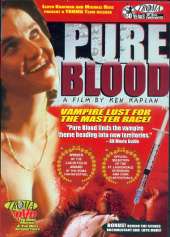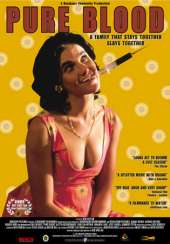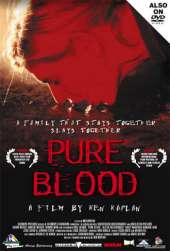
the vampire movie database
Pure Blood
| Release Date: | 2001 South Africa | Running time: | 92' (cover 90') - Source: DVD (RC 0/NTSC) | Rating: | US: NR | ||||
| Main Crew: |
Director: Kenneth Kaplan (Long Walk To Freedom 1998; The Prison Librarian 1996) Producer: Bioskope Filmworks / Videovision Entertainment / Revolution Films Score: Max Mikula Writer: Kenneth Kaplan Director of photography: Jonathan Kovel |
||||||||
Cast: |
| Summary: |
Some families have real problems´┐Ż | For Fanus (Carl Beukes), a young cop dreaming of promotion to the elite Flying Squad unit, everything was going just fine. That is, until the day he went for his routine blood test for his transfer application. Somehow the return of his estranged brother, Eugene (Danny Keogh), long assumed dead, was not quite the happy family reunion Fanus was expecting. Ravaged by illness and a mysterious affliction, relieved only by the intake of human blood, Eugene clearly has problems re-adjusting to suburban family life. Only the maid, Hope (Nomsa Nene), understands the truth behind Eugene's antics as he resorts to his old drunken behaviour. Little does Fanus know that his "racially pure" blood is the reason Eugene is back home. His career in the police force takes an unfortunate turn as Fanus, unwittingly, becomes the key accomplice in a plot to resurrecting his dead father, a General and mastermind of the old sinister order once called apartheid. What the General (Marius Weyers) needs is 'pure blood' - and it is Eugene they have summoned with promises of immortality and glory. Believing that he is the 'chosen one', Eugene is outraged to discover that the Generals seek Fanus as their successor. From that point on it is inevitable: one of the brothers must die. Combining a new age black maid, blood-drinking vampire racists and a plot to poison the town with blood cakes, what ensues is a dark comedy that pits the forces of fascism against the redeeming power of true love and home cooking´┐Ż For Fanus the only hope is Hope herself´┐Ż Note: |
- Ken Kaplan's debut feature film (described as a "political horror film", made in 1999, at a time when the former home of Apartheid was going through its second set of democratic elections ever) has won the Lucio Fulci Award (Best First Film by a director) at the 21st Rome Fanta Festival (held in Rome from June 16-20 2001). |
- The movie (with a 103 page script that was shot in 4 weeks) is the first South African financed feature film to come out of the Government's Department of Arts & Culture and the National Film & Video Foundation, a statuary body created following the country's democratic elections to promote and develop a new cinema culture. - Kenneth Kaplan (whose first short movie The Hidden Farms (1986) was banned as "undesirable" by the government in South Africa) has made a name for himself in South Africa as a filmmaker who confronts the current issues facing his country. For over ten years, he has been making critically acclaimed dramas and documentaries. - Apartheid (defined by the Rome Statute as one of eleven crimes against humanity) was a system of racial segregation that was enforced in South Africa from 1948 to 1994. Under apartheid, people were legally classified into a racial group - the main ones being White, Black, Indian and Coloured - and were geographically, and forcibly, separated from each other on the basis of the legal classification. Education, medical care, and other public services were sometimes claimed to be separate but equal, but those available to non-white people were in fact vastly inferior. By 1980, South Africa was the only country in Africa with a white government and a constitution discriminating against the majority of its citizens. In his opening address to parliament in February 1990, President Frederik Willem De Klerk announced that he would repeal discriminatory laws and lift the ban on the ANC, the UDF, the PAC, and the Communist Party. Media restrictions were lifted, and De Klerk released political prisoners not guilty of common-law crimes. On 11 February 1990, 27 years after he had first been incarcerated, Nelson Mandela walked out of the grounds of Victor Verster Prison a free man. In 1993, a draft constitution was published, guaranteeing freedom of speech and religion, access to adequate housing and numerous other benefits, and explicitly prohibiting discrimination on almost any ground. Finally, at midnight on 26-27 April 1994, the old flag was lowered, followed by the raising of the new rainbow flag.
|
|
short review: will come soon!!  |


